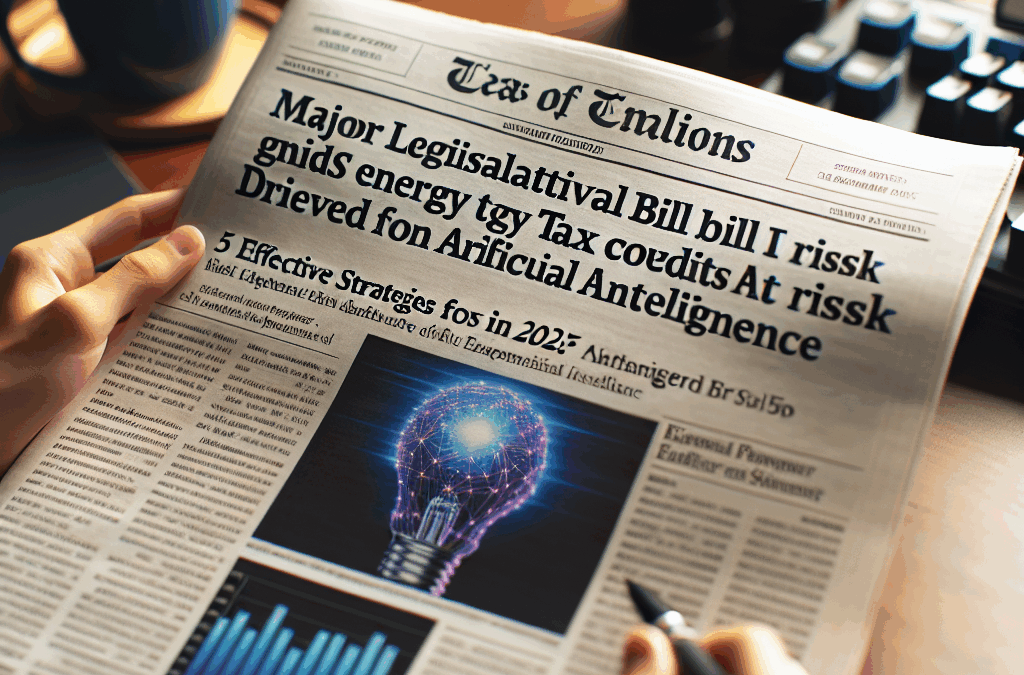1. Understanding the Impact of the GOP Megabill
The Current Energy Tax Credit Landscape
As we approach 2025, itâs crucial to recognize how the GOP megabill jeopardizes energy tax credits amid inflation and AI-driven demand. The proposed legislation could reshape the energy sector dramatically, impacting both consumers and businesses alike. Understanding these impacts will help us prepare for what lies ahead.
Energy tax credits have historically incentivized investment in renewable energy sources. However, cuts from this megabill threaten to reduce funding and support for these crucial programs, potentially affecting sustainability initiatives across the nation.
With inflation looming, the urgency to balance budgets against rising energy costs becomes essential. Those investing in clean energy may find it challenging to secure funding while navigating this new legislative landscape.
Economic Implications
The potential economic fallout from the GOP megabill could lead to higher energy costs for consumers. This bill’s restructuring of tax credits means that businesses may scale back on energy-efficient upgrades, essentially reversing progress made in reducing carbon footprints.
According to a recent study, businesses foreseeing a loss of tax credits due to legislative changes are 30% less likely to invest in renewable technologies.
Being informed and adapting our strategies ensures we are not only prepared but continue to thrive despite these challenges.
2. Optimize Tax Credits in Informational Workshops
Facilitating Community Engagement
Hosting workshops can significantly aid in navigating the confusing landscape created by the GOP megabill jeopardizes energy tax credits amid inflation and AI-driven demand. Community engagement helps individuals and businesses understand what tax credits are available and how best to leverage them.
By bringing in tax professionals, you can provide attendees with personalized information tailored to their unique situations. This interaction can demystify the tax code and transform uncertainty into actionable strategies.
Furthermore, collaborating with local government units can amplify outreach efforts, ensuring that even those who typically lack access to such information can benefit.
Building Valuable Resources
Creating digital toolkits and resource guides can empower workshop participants further by giving them invaluable insights that can be revisited even after the event. Consider including templates for applications and a list of critical timelines for tax credit opportunities.
This can transform your workshops from informational events into comprehensive learning experiences, equipping said consumers with the tools they need for financial resilience.
3. Leverage AI for Energy Efficiency
Investing in Smart Technologies
In a time where the GOP megabill jeopardizes energy tax credits amid inflation and AI-driven demand, leveraging technology such as artificial intelligence is not just optional; itâs essential. AI can optimize energy consumption in both residential and commercial settings.
For instance, smart thermostats and AI-driven energy management systems can cut energy costs significantly while contributing to sustainability efforts.
Recent advancements indicate that implementing AI in energy systems can improve efficiency by up to 20%, making a compelling case for investment even amid challenging legislative circumstances.
Real-World Applications
Consider learning from companies that have integrated AI into their energy systems, seeing substantial cost savings while enhancing their market position. By harnessing these technologies, organizations can remain competitive even as tax credit incentives fluctuate.
Investing now means reaping the benefits of innovation that aligns with environmental goals and potentially buffering against the impacts of the GOP megabill.
4. Build Community Support for Energy Initiatives
The Power of Collective Action
As we face challenges posed by the GOP megabill jeopardizes energy tax credits amid inflation and AI-driven demand, organizing community support for energy initiatives becomes crucial. Collaborating with like-minded entities can amplify our voices and influence policy changes.
Community initiatives, such as group purchasing for solar panels, can enhance bargaining power and lower costs for participants. This collective action showcases the community’s commitment to sustainability, often attracting additional support from local governments.
Creating a feedback loop within the community is vital. Encourage local water councils, chambers of commerce, and advocacy groups to participate actively in these discussions to bolster influence.
Engagement through Social Media
Utilizing social media platforms can help spread awareness around the importance of supporting energy initiatives. Regularly sharing updates about community initiatives can boost engagement and encourage new members to join the cause, creating buzz around the issues at hand.
Highlighting personal stories through social media showcases real-world impacts, fostering a deeper emotional connection with potential supporters, and pushing for legislative recognition.
5. Stay Informed on Legislative Changes
Monitoring Policy Developments
To actively adapt to how the GOP megabill jeopardizes energy tax credits amid inflation and AI-driven demand, staying informed about legislative shifts is essential. Follow trusted news sources, subscribe to legislative alerts, and participate in policy briefings regularly.
Understanding the nuances of these laws can enable businesses and individuals to reposition themselves proactively, ensuring they are not blindsided by changes that directly affect their operations.
Networking with policymakers can provide insights into forthcoming legislation, allowing stakeholders to express their positions and align their strategies accordingly.
Joining Advocacy Groups
Engaging with coalitions and advocacy groups dedicated to energy issues can amplify your voice. Membership often comes with access to valuable resources, campaigns, and networks advocating for beneficial legislation.
These groups can often mobilize public support effectively, making it harder for detrimental policies to take root without considerable pushback.
Frequently Asked Questions
What does it mean when the GOP megabill jeopardizes energy tax credits amid inflation and AI-driven demand?
This phrase highlights the potential harmful effects of a specific legislative act on energy tax credits, which could significantly affect the investment landscape in renewable energy amid rising inflation and an increasing demand driven by technological advancements.
How can businesses prepare for changes from the GOP megabill?
Businesses should explore alternatives around energy financing, leverage innovative technologies, and remain actively involved in local policy discussions to better navigate the evolving landscape.
Are there specific industries most affected by the GOP megabill?
Industries reliant on clean energy credits, such as solar and wind power, may face the most immediate impact; however, significant shifts could influence various sectors fundamentally.
Could innovative technology offset tax credit losses?
Investing in AI and energy-efficient technologies can provide significant cost reductions, potentially offsetting the impact of lost tax credits.









